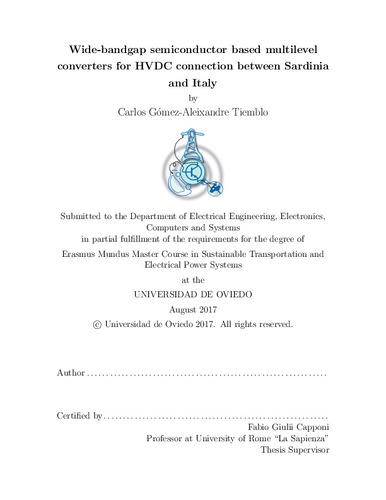Wide-bandgap semiconductor based multilevel converters for HVDC connection between Sardinia and Italy
Author:
Director:
Publication date:
Serie:
Máster Universitario Erasmus Mundus en Transporte Sostenible y Sistemas Eléctricos de Potencia (EMMC STEPS)
Descripción física:
Abstract:
In this thesis, the possibility to apply wide-bandgap semiconductor based multilevel converters to the refurbishment of the existing HVDC connection between Sardinia, Corsica and the Italian mainland, named SACOI (300 MW, 200kV), is studied. For that purpose, the work starts with the model of the current system, with 12 pulse thyristor based converters, using mainly Simulink. After that, the new power conversion system is designed and modelled, considering di erent possible con guration for multilevel converters ( nally focusing on modular multilevel converters) and their advantages and drawbacks. Once the simulation models with their control strategies are obtained, the performance of both systems (with 12 pulse thyristor based converters and with modular multilevel converters) are analysed and compared, focusing on some important aspects like: harmonic distortion (both in the DC and the AC sides), active and reactive power exchange control capability, etc. Finally, the results are analyzed and show the importan advantages of MMC agains the current system (reactive power management and less harmonic distortion)
In this thesis, the possibility to apply wide-bandgap semiconductor based multilevel converters to the refurbishment of the existing HVDC connection between Sardinia, Corsica and the Italian mainland, named SACOI (300 MW, 200kV), is studied. For that purpose, the work starts with the model of the current system, with 12 pulse thyristor based converters, using mainly Simulink. After that, the new power conversion system is designed and modelled, considering di erent possible con guration for multilevel converters ( nally focusing on modular multilevel converters) and their advantages and drawbacks. Once the simulation models with their control strategies are obtained, the performance of both systems (with 12 pulse thyristor based converters and with modular multilevel converters) are analysed and compared, focusing on some important aspects like: harmonic distortion (both in the DC and the AC sides), active and reactive power exchange control capability, etc. Finally, the results are analyzed and show the importan advantages of MMC agains the current system (reactive power management and less harmonic distortion)
Collections
- Trabajos Fin de Máster [5247]
Files in this item





